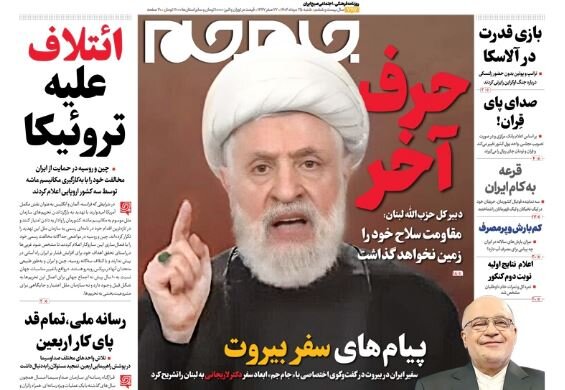An important trip to Lebanon

TEHRAN - In an interview with Mojtaba Amani, the Iranian Ambassador to Lebanon, Jam-e-Jam examined the significance of the trip of Dr. Ali Larijani, Secretary of the Supreme National Security Council, to Iraq and Lebanon.
He said: This trip took place in a situation where the region is in an extremely tense and sensitive security situation, and the Zionists and the United States are designing dangerous plans. This trip in itself was an important success for Iranian diplomacy, especially since it took place at a time when the opponents of the Islamic Republic were trying to present an isolated image of Iran. Also, Hezbollah's opponents, the Zionist regime, and the Americans, were pursuing a policy that conveyed the illusion that Hezbollah was not victorious. They wanted to convey the idea that this movement had failed, was incapable of revival, and had left the scene. Therefore, one of the manifestations that could have neutralized this fancy was the presence of a high-ranking Iranian official in Lebanon as a supporter of the resistance. The positive developments and news during this trip left a significant impact. The wave of public acceptance and positive news atmosphere overcame all the efforts of the enemies.
Etemad: Trump route and a solution for it
Etemad commented on the Zangezur Corridor (also called Trump Route) and wrote: In order to maintain and enhance its position in the regional transit networks and confront negative geopolitical trends, Iran needs a comprehensive strategy that simultaneously encompasses economic and political dimensions. The first step is to strengthen its geopolitical position through strategic partnerships with neighboring countries and regional actors. Iran must be able to become an actor by creating a network of political and economic cooperation that would be costly and difficult to eliminate from geopolitical equations. The second step is to use economic diplomacy as a complement to foreign policy. The third step is to develop and update transportation infrastructure. The combination of these three approaches can solidify Iran's position on the global transit map. In such a framework, Iran will not only maintain its share in the transit market but will also use communication routes as a lever to increase its political and security influence in the region and beyond.
Arman-e-Melli: Enrichment through a consortium
Arman-e-Melli discussed the issue of nuclear enrichment through a consortium in an interview with Sabah Zangeneh, an international relations expert. He said: Iran has a history of limiting the production of enriched uranium, and with this history, it is ready to limit production. In any case, the issue of enrichment has many dimensions. One of these dimensions is the construction of equipment, storage, distribution, investment, research, and development. All of these dimensions are negotiable in forming a consortium. The consortium can solve many issues because there are some member countries in this consortium. It will also provide good assurance to all member countries in the consortium, and with the presence of several countries, the enrichment path will never deviate (from its peaceful course). From this point of view, it should be said that Iran's policies in the nuclear field and the negotiations have been announced; now it remains to be seen what the reaction of other countries, including the United States, will be to this proposal.
Ettelaat: Consequences of snapback mechanism
Ettelaat sought the views of Hassan Beheshtipour, an international affairs analyst, about the snapback mechanism. He said: Europe has decided to activate the snapback mechanism and is raising this issue with great noise in the media to force Iran to react. However, this mechanism does not impose tougher and broader sanctions on the country from a sanctions point of view. However, politically, the return of Security Council sanctions is detrimental to Iran. This situation will be used against Iran within an international framework. In fact, if new sanctions are imposed, nothing extraordinary will happen. The primary concern is that, from a legal standpoint, resolutions issued against Iran carry adverse implications and exert significant influence on both political and security dynamics. UN sanctions have a legal aspect, and their return could create legal consequences against Iran. This is important, although from an economic point of view, it will not have a special impact on the country's economy, it hurts the country's political image and is detrimental to the country from a security point of view.
Leave a Comment